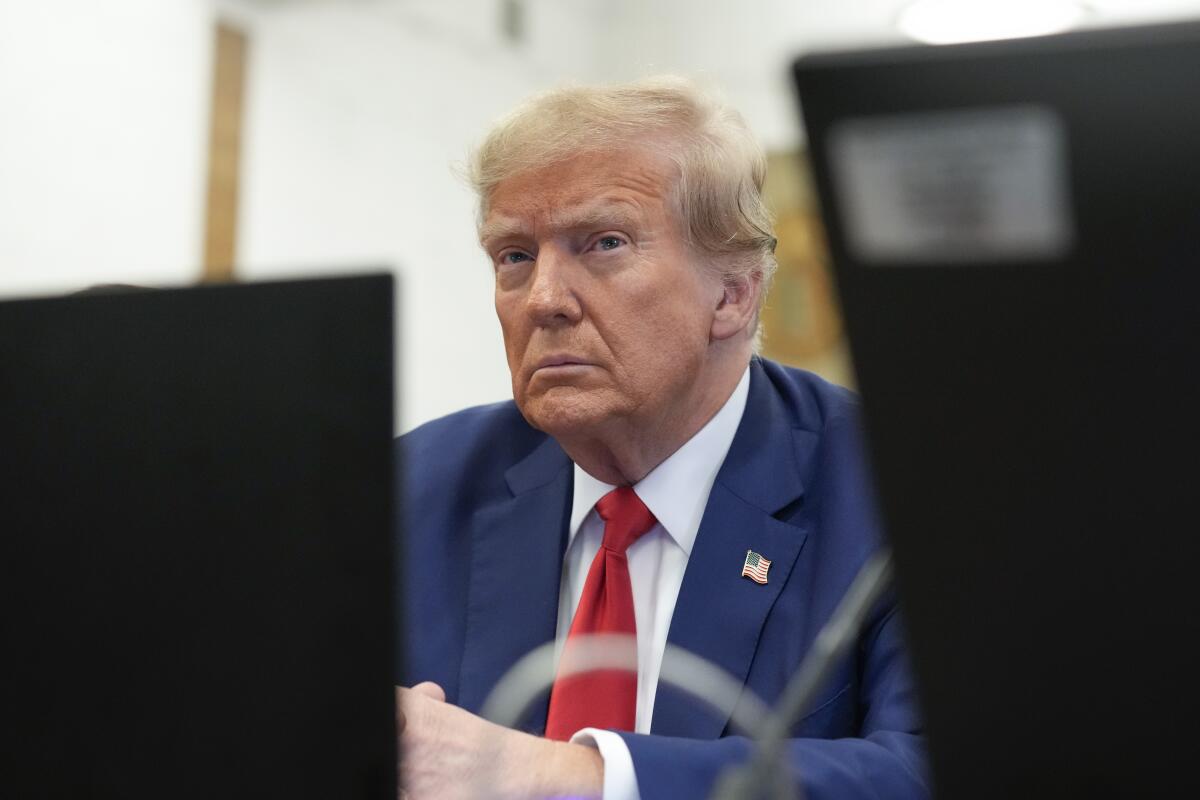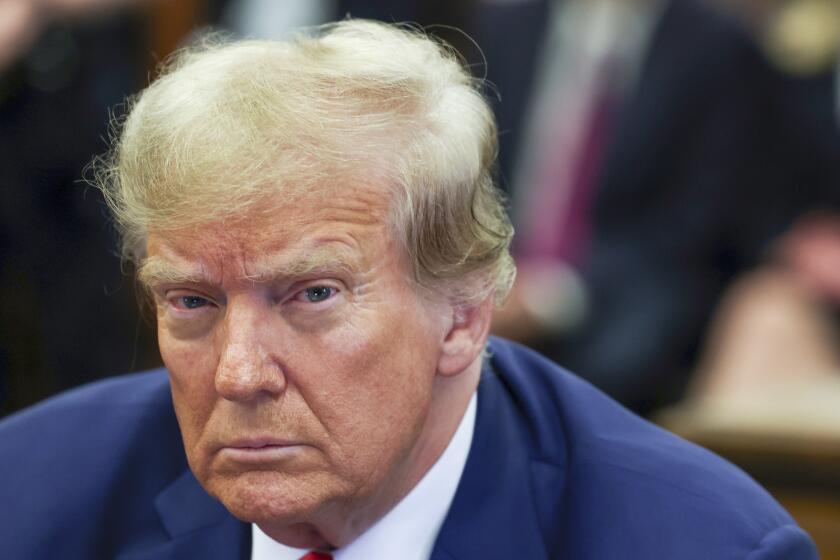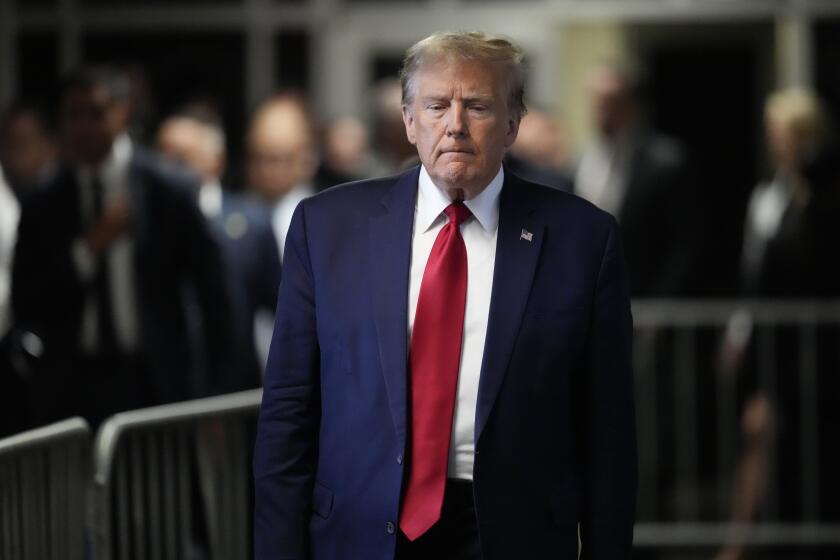Trump’s trials: Recent court delays could boost his election chances

- Share via
WASHINGTON — As he campaigns for a return to the White House, former President Trump faces criminal prosecution in four separate trials. He’s also had two civil trials that resulted in hundreds of millions of dollars in fines.
Here’s what’s going on with the cases as primary elections ramp up across the nation, and what to expect in the weeks ahead:
Supreme Court reviewing presidential immunity
By agreeing to take up a question of presidential immunity this week, the Supreme Court dealt a severe blow to special counsel Jack Smith’s plans to prosecute Trump anytime soon for actions related to his attempts to subvert the results of the 2020 presidential election.
Originally scheduled to begin this coming Monday, the trial potentially will be delayed until after the 2024 presidential election.
The Supreme Court gave Trump a partial victory by delaying his trial to consider the former president’s claim of immunity.
Judge Tanya Chutkan, the trial judge, rejected Trump’s claim that he was immune from criminal charges brought because of “official acts” taken while in office. She said the Constitution does not give former presidents absolute immunity for their past crimes.
In December, Smith urged the Supreme Court to fast-track consideration of that question so it could be resolved by March. The justices refused and sent the question to the Court of Appeals for the D.C Circuit, which took until early February to rule against Trump. He quickly appealed to the Supreme Court, which on Wednesday announced it will hear arguments on the question during the week of April 22. The high court is expected to wait until the end of June to hand down a written ruling.
The trial is on hold until the question of presidential immunity is resolved and Trump’s attorneys have indicated that they will need several weeks to prepare once the trial is allowed to move forward. They could even raise new objections that could further delay the trial.
On top of the procedural hurdles, the Justice Department has a policy of avoiding new prosecutions that could affect pending elections, and that might stand in the way of a fall trial featuring the expected Republican presidential nominee.
All of that adds up to the possibility that even if Trump eventually loses in court he may have already gained an advantage at the ballot.
Classified documents
Some of those other potential challenges that could come up in the 2020 election subversion trial will be considered soon in the case over Trump’s handling of classified documents and alleged attempts to prevent the government from recovering them from his Mar-a-Lago estate. He faces 41 felony charges.
On Feb. 23, Trump’s legal team filed multiple motions seeking dismissal of the case, including on a claim of presidential immunity, selective prosecution and contesting the appointment of Smith in the case.
Judge Aileen Cannon, who is presiding over the case, on Tuesday denied efforts by Trump’s co-defendants to view the classified records they allegedly moved around the former president’s Mar-a-Lago residence in Florida for him.
On Thursday, Cannon ruled that Trump’s legal team would not get access to classified filings submitted by the special counsel’s office about the contents of the classified documents seized at Trump’s home by the FBI.
Cannon held a hearing Friday — but took no immediate action — on whether to move the trial date from the end of May to address the dismissal requests and accommodate Trump and his co-conspirator’s desire for more time to build their arguments.
New York civil fraud suit
Meanwhile in New York on Wednesday, Associate Justice Anil C. Singh in the New York State Supreme Court’s Appellate Division rejected a request from Trump to accept a $100-million bond or delay enforcement of a fine totaling at least $450 million while he appeals. Trump’s attorneys said he may have to sell off properties as a result.
In mid-February, Manhattan Supreme Court Justice Arthur Engoron issued the fines after finding Trump and others guilty of giving false information to financial institutions and insurance companies so they could borrow money at lower rates and save on costs.
Along with the fines and interest, Engoron also ruled that Trump and his adult sons were banned from holding top jobs in New York corporations for several years.
Trump’s lawyers have filed a notice that they intend to appeal Engoron’s decision, but to do so Trump must post a bond for the full amount of the judgment.
Engoron’s decision came on the heels of an $83.3-million judgment against Trump for defaming columnist E. Jean Carroll after he was found liable for sexually assaulting her in the 1990s.
A New York judge has refused a request by President Trump’s lawyers to accept a $100-million bond to halt the state’s collection of his $454-million penalty while he appeals.
New York hush money case
With the delay caused by the Supreme Court taking on the presidential immunity question, the first felony case Trump is expected to face will be about whether he falsified business records to cover up his lawyer Michael Cohen’s $130,000 payment in the final days of the 2016 campaign to adult film actor Stormy Daniels for her silence about a 2006 sexual encounter she says she had with Trump.
Jury selection is scheduled to start March 25. Last month prosecutors asked Judge Juan Manuel Merchan to bar Trump from making or directing others to make public statements about potential witnesses and jurors, as well as statements meant to interfere with or harass the court’s staff, prosecution team or their families.
Prosecutors in Donald Trump’s New York hush-money criminal case have asked a judge to impose a gag order on the former president.
Georgia election subversion case
Soon we will know whether Trump and his co-conspirators are successful in their attempts to disqualify Fulton County Dist. Atty. Fani Willis and special prosecutor Nathan Wade from pursuing charges against them because of their personal relationship.
After a whirlwind seven weeks of hearings full of salacious details, text messages and fiery appeals, Superior Court Judge Scott McAfee heard closing arguments on Friday about whether the relationship warrants disqualifying the entire district attorney’s office from pursuing charges against Trump and his supporters for trying to overthrow the 2020 presidential election in Georgia.
This is the only state-level case Trump faces in relation to his efforts to stay in power after losing to Joe Biden.
Willis has requested an August trial date, but depending on how the timing of the federal trials shift, she could ask for a date in early summer.
Times staff writer David G. Savage contributed to this report.
More to Read
Get the L.A. Times Politics newsletter
Deeply reported insights into legislation, politics and policy from Sacramento, Washington and beyond. In your inbox twice per week.
You may occasionally receive promotional content from the Los Angeles Times.












